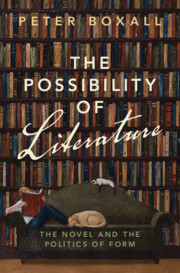Book contents
- The Possibility of Literature
- The Possibility of Literature
- Copyright page
- Dedication
- Epigraph
- Contents
- Figures
- Acknowledgements
- Introduction
- Part I On Writers
- Chapter 1 A Sort of Crutch
- Chapter 2 Samuel Beckett
- Chapter 3 A Leap Out of Our Biology
- Chapter 4 A More Sophisticated Imitation
- Chapter 5 A Cleaving in the Mind
- Chapter 6 Zadie Smith, E. M. Forster and the Idea of Beauty
- Part II On Literary History
- Part III On the Contemporary
- Notes
- Bibliography
- Index
Chapter 5 - A Cleaving in the Mind
Kelman’s Later Novels
from Part I - On Writers
Published online by Cambridge University Press: 10 October 2024
- The Possibility of Literature
- The Possibility of Literature
- Copyright page
- Dedication
- Epigraph
- Contents
- Figures
- Acknowledgements
- Introduction
- Part I On Writers
- Chapter 1 A Sort of Crutch
- Chapter 2 Samuel Beckett
- Chapter 3 A Leap Out of Our Biology
- Chapter 4 A More Sophisticated Imitation
- Chapter 5 A Cleaving in the Mind
- Chapter 6 Zadie Smith, E. M. Forster and the Idea of Beauty
- Part II On Literary History
- Part III On the Contemporary
- Notes
- Bibliography
- Index
Summary
The current conception of political literature is still influenced, to a significant extent, by the commitment debate between Theodor Adorno and Georg Lukács, in which the political power of the literary imagination rests either in its abstract freedom from political realities (Adorno), or in its close fidelity to them (Lukács).
This essay suggests that an understanding of James Kelman’s writing, as a singular form of political literature, requires us to move beyond this opposition. In blending a writing that is deeply committed to locality and to place with a writing affiliated to the abstractions of Kafka and Beckett, Kelman’s work suggests new ways of imagining the terms in which the mind is both free from and bound to its determining conditions. The essay offers a reading of Kelman’s later novels – Translated Accounts, You Have to be Careful in the Land of the Free and pre-eminently Kiron Smith, boy – in order to develop an account of a political imagination that is attuned to the particular cleaving that Kelman performs, between freedom and servitude, between place and the dismantling of place.
- Type
- Chapter
- Information
- The Possibility of LiteratureThe Novel and the Politics of Form, pp. 104 - 116Publisher: Cambridge University PressPrint publication year: 2024

